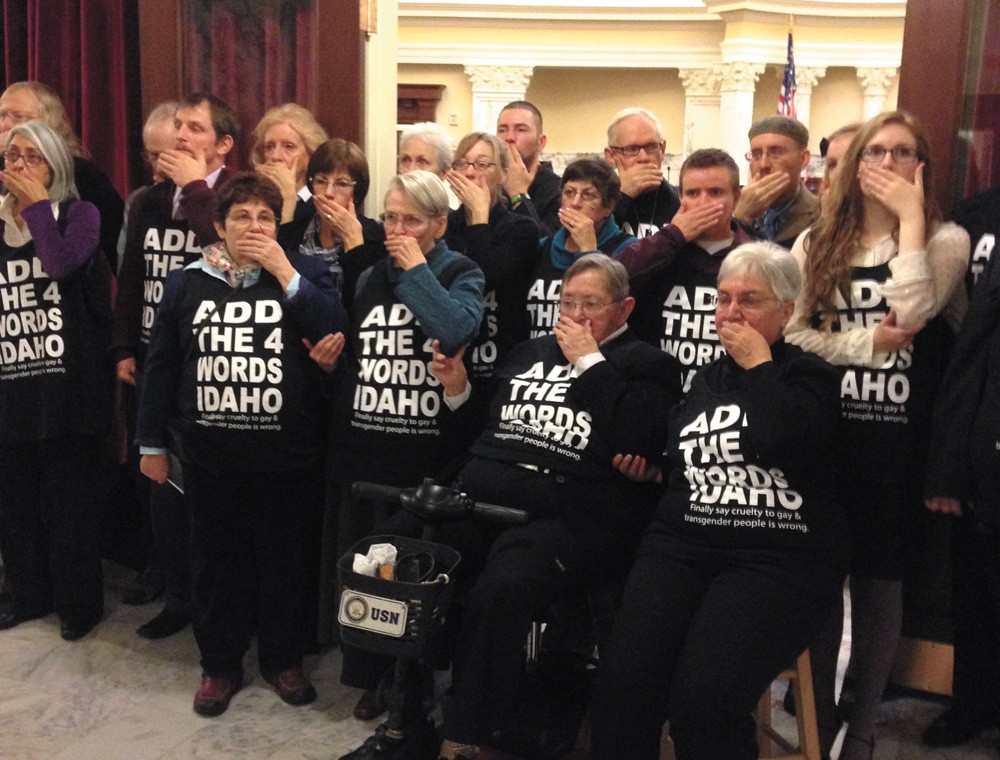
In December 2011, Sandpoint became the first Idaho city to pass a citywide ordinance barring discrimination in housing, employment and public accommodations based on sexual orientation or gender identity. Three years later, six other Idaho cities — including Coeur d’Alene, Moscow and Boise — have similar measures on the books.
Federal law doesn’t protect gay or transgender people from discrimination. Neither does Idaho’s Human Rights Act. For human rights advocates, passing local anti-discrimination ordinances was the perfect strategy, second to amending Idaho state law, to protect LGBT people. Now, new bills in the Idaho Legislature threaten to gut these local anti-discrimination laws. Critics say they’ll codify discrimination.
Last week, Rep. Lynn Luker, R-Boise, introduced two bills aimed at providing more protection to individuals and business owners on religious grounds. House Bill 426 would keep professionals, such as doctors and counselors, from having their occupational licenses revoked if they refused services or denied employment to people based on a “sincerely held religious belief.” (The bill doesn’t protect individuals from being fired, nor does it apply to emergency responders.) House Bill 427 amends Idaho’s Religious Freedom Restoration law so individuals can use religion as a defense or in an affirmative claim in discrimination suits.
“In both cases, it not only does not advance human rights … this actually moves us backwards,” says Tony Stewart from the Kootenai County Task Force on Human Relations. “It seems very, very tragic.”
Stewart isn’t optimistic. The bills already have been promised a hearing. The Arizona Legislature passed a similar law expanding religious protections. Monica Hopkins, the executive director of the American Civil Liberties Union of Idaho, argued that Luker’s legislation is so broad, any public servant or business owner could discriminate against a class of people using religion as an excuse. Imagine a Christian Identity doctor who refuses to treat an African-American or Jewish patient, or an Orthodox employer who fires an unmarried female employee for getting pregnant, Hopkins says. Under HB 427, she says, he could even sue her.
“What is shocking is here we’re celebrating the 50th anniversary of the Civil Rights Act of 1964,” Hopkins says. “Instead of celebrating the fact that the dreams of Dr. Martin Luther King became enshrined in this law that said we should not discriminate … the legislators are seeking to undo that law by using their religions to discriminate.”
Luker, however, insists the bills aren’t intended to target or deny services to LGBT people or any other community. Rather, he says his critics have ignored the true issue he’s trying to address: “oppression of those with religious faith.”
“The bills are premised upon the growing interference through government mandate in the lives of all people who have religious convictions that are being burdened or ignored by governments,” he explained in an email to the Inlander.
An “Add the Words” bill to amend the state’s Human Rights Act to cover “sexual orientation” and “gender identity” has been proposed in every legislative session over the past eight years, but has never received a committee hearing. On Monday morning, “Add the Words” protesters descended upon the Idaho statehouse. They stood shoulder to shoulder with their hands over their mouths, blocking every entrance to the Senate chambers. Forty-four people, including former Boise state Sen. Nicole LeFavour, the legislature’s first openly gay lawmaker, were arrested.
“We know that the ones that will be punished the most are the most vulnerable,” says Sen. Cherie Buckner-Webb, D-Boise, this year’s co-sponsor. “We need to talk to our constituents and hear the message they’re trying to share with us — that people should be treated humanely, equitably and honorably.” ♦

















